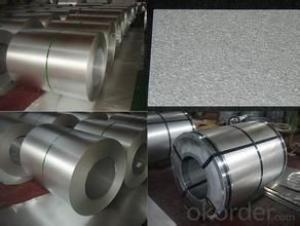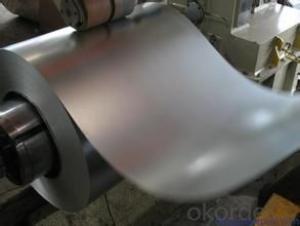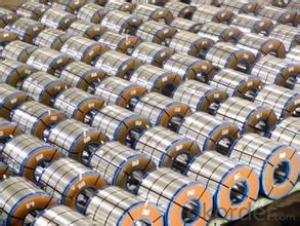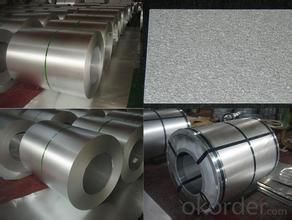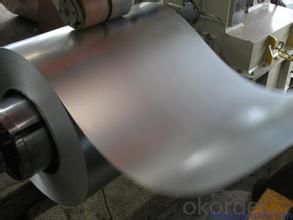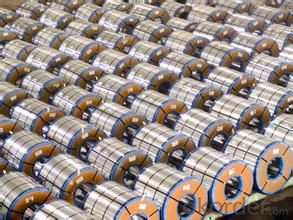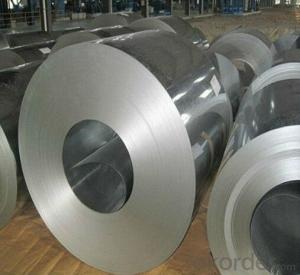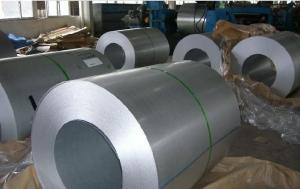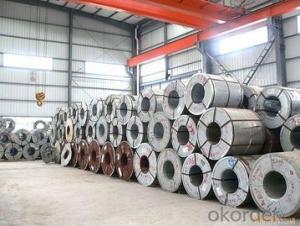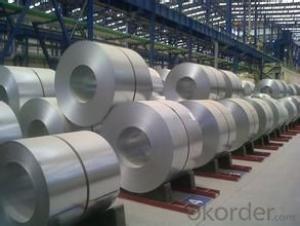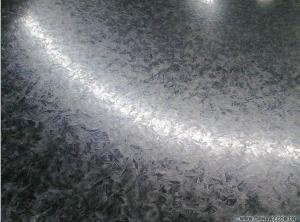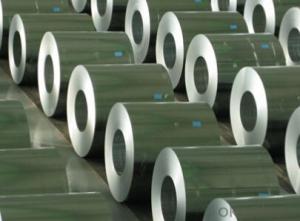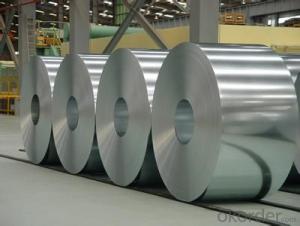The Best Hot-dip Aluzinc Steel Building Roof Walls JIS G3321
- Loading Port:
- China main port
- Payment Terms:
- TT OR LC
- Min Order Qty:
- 50 m.t.
- Supply Capability:
- 10000 m.t./month
OKorder Service Pledge
OKorder Financial Service
You Might Also Like
Hot-dip Aluzinc Steel Building Roof Walls
1. Description of the Hot-dip Aluzinc Steel:
Hot-dip aluzinc steel structure is composed of aluminum-zinc alloy, consisting of 55% aluminum, 43% zinc and 2% at 600 ℃ silicon solidification temperature and composition, the entire structure is made of aluminum - iron - silicon - zinc, to form a dense quaternary crystals an alloy.
Hot-dip aluzinc steel has many excellent features: strong corrosion resistance, is three times the pure galvanized sheet; zinc surface with beautiful flowers, can be used as a building outside board.
Applications of hot-dip aluzinc steel:
1)Building: roof, walls, garages, soundproof walls, pipes and modular housing.
2)Automotive: muffler, exhaust pipes, wiper accessories, fuel tank, truck boxes, etc.
3)Appliances: refrigerator back, gas stove, air conditioners, microwave oven, LCD frame, 4)CRT-proof band, LED backlight, electrical cabinets, etc.
5)Farm: barn, sheds, silos, piping and other greenhouse.
6)Other: breaking heat insulation cover, heat exchangers, dryers, warm water, etc.
2.Main Features of the Hot-dip Aluzinc Steel:
• Excellent corrosion resistance
• High temperature oxidation resistance
• High hot reflectance
• Good manufacturability
•Beautiful appearance
•Surface coating
•Cost-effective
3.Hot-dip Aluzinc Steel Images
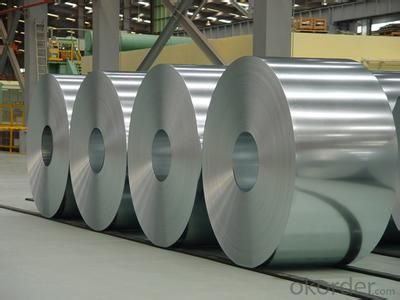
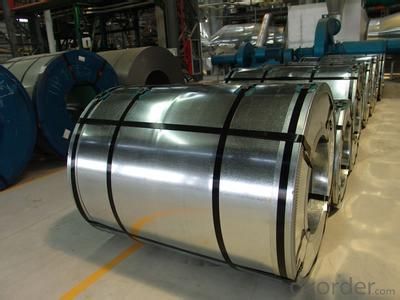
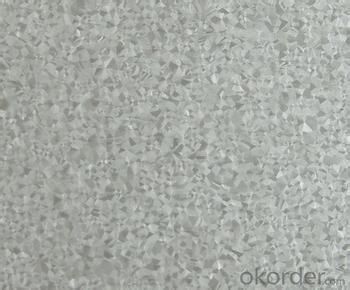
4.Hot-dip Aluzinc Steel Specification
AVAILABLE SPECIFICATION
HOT-DIP ALUZINC STEEL COILS | |
THICKNESS | 0.16mm-3.5mm |
WIDTH | 1250mm MAX |
COATING MASS | 30g/ m2-185 g/ m2 |
SPANGLE | Regular Spangle, Minimized Spangle, Zero Spangle |
SURFACE TREATMENT | Chromated / non-chromated, Oiled / non-oiled, Anti Finger Print |
COIL INNER DIAMETER | 508mm or 610mm |
HOT-DIP ALUZINC STEEL COILS | |||
COMMERCIAL QUALITY | ASTM A792M-06a | EN10327-2004 | JIS G 3321:2010 |
STRUCTURE STEEL | SS GRADE 230 SS GRADE 255 SS GRADE 275 SS GRADE 340 SS GRADE 550 | S220GD+AZ S250GD+AZ S280GD+AZ S320GD+AZ S350GD+AZ S550GD+AZ | SGLC400 SGLC440 SGLC490 SGLC570 |
2.5.FAQ of Hot-dip Aluzinc Steel
We have organized several common questions for our clients,may help you sincerely:
1.What advantages does your company have?
Cement : Annual capacity of 400 million tons, No. 1 in the world
Fiberglass: Annual capacity of 1 million tons fiberglass, No. 1 in the world.
Composite Materials — Carbon Fiber: Annual capacity of 10,000 tons PAN precursor and 4,000 tons carbon fiber, No. 1 in China
Composite Materials — Rotor Blade: Annual production capacity of 15,000 pieces, No.1 in China, Top3 worldwide
Glass: CNBM owns about 20 modern float glass product`ion lines, With annual capacity of 10 million square meters glass.
Light Weight Building Materials: Annual capacity of 1.65 billion square meters of gypsum board, No. 1 in the world.
Commercial concrete: Annual capacity of 0.35 billion cubic meters, No. 1 in the world.
Refractory Material: Annual capacity of 40,000 tons casting refractory, No.1 in the world.
2.What advantages do your products have?
Firstly, our base material is of high quality, Their performance is in smooth and flat surface,no edge wave ,good flexibility.
Secondly, high quality zinc ingoats, 97.5% zinc,1.5% silicon,1% others, the same zinc coating measured by metal coating thickness or by zinc weight
Thirdly, high precision: Tolerance strictly according to ASTM or JISG standard even more rigid.
We have full stes of testing equipment(for t best, cupule,chromatism,salt spray resistance, etc) and professional engineers.
- Q: How are steel coils used in the production of steel rings?
- Steel coils are used in the production of steel rings by being fed through a machine that cuts and shapes the coil into individual rings. These rings can then be further processed and manipulated to create a wide range of steel products, such as bearings, pipe fittings, or automotive components.
- Q: How are steel coils coated for specific applications?
- Steel coils are coated for specific applications using a process called coil coating. In this process, the steel coils are cleaned, treated, and then coated with a layer of paint or other protective material. The coating is applied evenly and precisely to ensure optimal performance and durability in the intended application.
- Q: How are steel coils used in the production of electrical conduits?
- Steel coils are used in the production of electrical conduits in several ways. Firstly, steel coils are used as the raw material for manufacturing electrical conduits. These coils are made of high-quality steel that is specially processed and formed into a long, continuous strip. Once the steel coils are obtained, they are fed into a machine called a slitter. The slitter cuts the coils into narrower strips of the desired width. These narrower strips will serve as the base material for the electrical conduits. The next step is to shape the steel strips into the desired conduit shape. This is done by passing the strips through a series of rollers and other shaping tools. The steel strips are gradually formed into the round or rectangular shape of the conduit. The rollers apply pressure and manipulate the steel strip until it reaches the desired shape. After the shaping process, the ends of the steel strips are welded together to create a continuous conduit. This welding process ensures that the conduit will have a seamless structure, which is important for its functionality and durability. Once the conduits are formed and welded, they undergo further processing to enhance their properties. This may include processes such as galvanizing, where the conduits are coated with a layer of zinc to protect them from corrosion. This additional layer provides the conduits with increased longevity, making them suitable for various electrical applications. In summary, steel coils are essential in the production of electrical conduits. The coils serve as the raw material that is shaped, welded, and processed to create the final product. The use of steel coils ensures that the electrical conduits are strong, durable, and capable of withstanding the demands of electrical installations.
- Q: What is the role of steel coils in the manufacturing of bridges?
- Steel coils play a crucial role in the manufacturing of bridges as they are used as the primary material for constructing the structural components of the bridge, such as beams, columns, and girders. These coils are manufactured by rolling steel into flat strips, which are then wound into large coils. The high strength and durability of steel make it an ideal choice for bridge construction, as it can withstand heavy loads, extreme weather conditions, and provide long-lasting support. The coils are processed further to fabricate the required bridge components, ensuring the structural integrity and stability of the bridge.
- Q: Is Stainless steel called that because.....a. Its stains lessORb. Its virtually stainless (it can't stain).Lol do you know the correct answer?????
- Stainless Steel is named that because when compared to untreated steel it is virtually stainless. It is virtually stainless, and harbors very little germs and bacteria. That is why it has been the standard in the food industry for years.
- Q: How are steel coils used in the production of automotive parts?
- Steel coils are used in the production of automotive parts as they provide a durable and flexible material for making various components such as body panels, chassis, and suspension parts. The coils are processed through specialized machinery to cut, shape, and form the steel into the required parts, ensuring strength and precision. Additionally, the coils can be treated or coated to enhance corrosion resistance, further improving the longevity and performance of automotive parts.
- Q: What are the factors that determine the price of steel coils?
- There are several factors that determine the price of steel coils. 1. Raw material costs: The cost of raw materials, such as iron ore and coal, which are used in the production of steel, directly affect the price of steel coils. Any fluctuations in the prices of these raw materials can impact the final price of steel coils. 2. Energy costs: The energy required to produce steel coils, including electricity and fuel, is a significant factor in determining their price. Fluctuations in energy costs, such as changes in oil prices or electricity tariffs, can influence the overall price of steel coils. 3. Demand and supply: The demand and supply dynamics in the steel industry play a crucial role in determining the price of steel coils. When demand is high and supply is limited, prices tend to increase. Conversely, when demand is low and supply exceeds demand, prices tend to decrease. 4. Market conditions: The overall economic conditions and market trends can impact the price of steel coils. Factors such as economic growth, industrial production, and construction activities can influence the demand for steel and, consequently, its price. 5. Production and labor costs: The costs associated with steel coil production, including labor, equipment, maintenance, and transportation, contribute to the final price. Factors like labor wages, technological advancements, and production efficiency can influence these costs and, subsequently, the price of steel coils. 6. Trade policies and tariffs: Trade policies, including import and export tariffs, can affect the price of steel coils. Imposition of higher import tariffs can lead to an increase in domestic steel prices, while lower tariffs may result in lower prices due to increased competition from imports. 7. Currency exchange rates: Steel is a globally traded commodity, and fluctuations in currency exchange rates can impact its price. If the currency in which steel is priced strengthens against other currencies, it can result in higher prices for steel coils. It is important to note that these factors are interrelated and can vary depending on the specific market conditions, geographical location, and other external factors.
- Q: i know theres steel in it but what else?
- Corrosion resistant steel. Iron carbon alloy with a minimum of 10.5% chromium (Cr) content.
- Q: What are the different steel coil packaging methods?
- There are several different steel coil packaging methods, including using steel strapping or banding to secure the coils, using plastic or metal end caps to protect the edges of the coils, and using wooden or steel pallets to stack and transport the coils. Additionally, some steel coils may be wrapped in protective film or paper to prevent damage during shipping and storage.
- Q: I like non-stick cookware but it dont hold up no matter how much money you spend. What isthe best kind? Is there something better then stainless steel or iron skillet? I do not care if I have to use extra elbow grease to clean a pan.
- I have a combination of them both. I have Le Creuset enameled cast iron dutch-ovens, pots and pans; as well as All Clad stainless steel saute and deep-rimmed pans which have a copper core. I have one non-stick pan that I use for cooking eggs in.
Send your message to us
The Best Hot-dip Aluzinc Steel Building Roof Walls JIS G3321
- Loading Port:
- China main port
- Payment Terms:
- TT OR LC
- Min Order Qty:
- 50 m.t.
- Supply Capability:
- 10000 m.t./month
OKorder Service Pledge
OKorder Financial Service
Similar products
Hot products
Hot Searches
Related keywords
